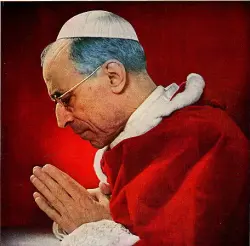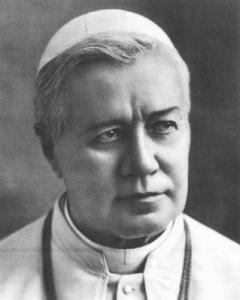Blog Archives
REBLOG: The Feast Of The Chair Of St. Peter
Tomorrow 22nd February is the feast of the Chair of St. Peter. Whilst St. Peter’s feast day is the 29th June, the feast of the 22nd February is more directly aimed at celebrating the Petrine Office. This feast is, therefore, as Catholic as they come.
This feast day might be an occasion to explain to some non-Catholic in your circle of acquaintances why you are Catholic. When requested, I proceed more or less in this way:
1) And I say to thee: that Thou are Peter…. Jesus doesn’t say to Simon that he is a nice chap; or that he is very perceptive; or that he himself is surprised that among the apostles Simon was the only one to give the right answer to his question “Who do people say that I am?”. No, he changes his name and calls him a rock.
2) and upon this rock I will build my Church…. Jesus doesn’t say “I will build my first church”, nor does he say “I will build my provisional church”. Jesus picks a rock, and builds upon him One (1, Una, Eine, Une) Church.
3) and the gates of Hell shall not previal against it….. It, that is: the very same Church built on Peter, the “rock”. That one, and no other. Jesus doesn’t say “the Gates of hell shall, in around fifteen centuries, prevail against the Church I built on you”, nor does he say “the Gates of Hell shall prevail against the Church built on you but hey, let us be happy with a generic term of “church” so it can work even when yours goes astray”. He is very specific: he builds one Church upon one man and gives his promise of indefectibility to this – and no other – organisation.
4) And I will give to thee the keys of the Kingdom of Heaven….. This is also dumb-proof: keys are a very obvious symbol of power and authority and it is clear here that Jesus is speaking with extreme solemnity. He doesn’t say to Peter: “Peter, you keep the key for the moment” or “look mate, gotta go; keep the keys until I find you or yours unworthy, will ya?”. No, this is a solemn promise evidently made for all times, as his just pronounced promise about indefectibility must make clear to the dumbest intellect.
5) ….and whatsoever thou shalt bind on earth it shall be bound also in heaven: and whatsoever thou shalt loose on earth, it shall be loosed also in heaven. For those who should at this point still not have gotten what is going on, Jesus becomes even more explicit: Peter has the keys, and the keys mean authority upon the faithful now and forever; an authority given in the most emphatic terms possible.
The meaning of these phrases; the clear solemnity Jesus gives to his words; the crescendo of emphatic declarations of such a broad and clear scope do not leave room for any possible doubt and as a result, Protestants have nowhere to hide. Whoever reads Jesus’ words with a minimum of intellectual honesty cannot avoid to recognise that the Only Church of Peter’s time (and of the following fifteen centuries) is the Only Church of today and that as a result whatever grievance against the men who run the Church does not change a iota concerning the position of authority of the Church. As to the complaint that some Popes were oh-so-bad (not much worse than many a tv-preacher I’d say, but laissons tomber….), Peter wasn’t immaculate either, but his shortcomings didn’t prevent Jesus from promoting him to rock of His Church.
To believe anything different from the fact that the Only Church founded by Jesus is.. the Only Church means to believe one or more of the following:
1) that Jesus made a mistake in founding His Church on Peter;
2) that Jesus was mistakenly persuaded that Peter’s successors would be good chaps, but had his toy ruined by the baddies who succeeded Peter;
3) that Jesus couldn’t count;
4) that Jesus’ words had a sell-by date, or
5) that Jesus made his promise of indefectibility without taking it seriously.
Or perhaps one could decide to read and understand the only possible meaning of such emphatically worded statements, as Jesus repeatedly made.
There is only One Church, folks. It’s the only one founded by Jesus. Simple, really.
Mundabor
Ascension, Pentecost And The Christian Nation
Soon the Feast of Ascension will be upon us; it will be followed, soon after, by Pentecost.
When I used to live in Germany, these were both public feast days. Actually, at Pentecost the festivity was the following day.
I never can understand when even people who consider themselves religious manage to separate the calendar from their religious convictions. Religion is not a private matter, something that you remember only when you are closed in your own bedroom and pray. Religion is very much a public matter, and Christianity, with its inherent claim to evangelisation and expansion, is the most public matter of them all.
It is true that Christians would celebrate Christmas even if it wasn’t a public festivity; but it is also true that when a Christian festivity is a feast day the following happens:
1) the Christian character of a country is reaffirmed;
2) Christianity is forcefully put to the attention of non-Christians;
3) the Christian calendar moulds collective identity, even for non-churchgoers.
The idea that it be all right for Christians to celebrate, say, Labour Day or those insipid, utterly stupid, PC-stinking “bank holidays” we have here in the UK without pushing for their substitution with Christian holidays is, in my eyes, not very Christian. In my opinion, public feast days on, at the very least, Ascension, Pentecost, Corpus Domini and Assumption should be in the private list of grievances of every UK Catholic, and the first two in that of every Christian. The Catholic – and not only Catholic – hierarchy should push for the recognition of at least the first two in lieu of those stupid, politically correct, tofu-like “bank holidays” or, in case and when necessary, through the reduction of statutory holiday rights. They might, admittedly, not succeed in this generation, but their assertiveness would put Christianity high on the agenda and force the country to think about what it want to be, and what price it would pay if the wrong decision is taken.
These days, middle ways are difficult to maintain and – as I have heard saying – he who stays in the middle of the road risks ending up under a truck. Cue the calls for the abolition of Christmas as a festivity, or the renaming of Christmas markets as “winter lights” – or such bollocks – already seen all over England.
Christianity can’t be protected by half, and neutrality is of no use. You either fight for the Christian values of your country, or you will be forced in a rearguard battle by the ever complaining, now more and more aggressive atheists.
In countries like Italy – where the situation is not ideal, either – every city has a feast day on the day of his patron saint. Think of what this means: that the city puts itself under the protection of a saint, and that this is made clearly visible as a social, and not merely religious, event.
Feast days alone will, admittedly, not cause a country to become more Christian. But by clearly marking the Christian ground, they will at least make it more difficult for it to become less Christian, and will be a public call to conversion in times of licence and unbelief.
Christianity is not a private matter.
Mundabor
The Feast Of The Chair Of St. Peter
Tomorrow 22nd February is the feast of the Chair of St. Peter. Whilst St. Peter’s feast day is the 29th June, the feast of the 22nd February is more directly aimed at celebrating the Petrine Office. This feast is, therefore, as Catholic as they come.
This feast day might be an occasion to explain to some non-Catholic in your circle of acquaintances why you are Catholic. When requested, I proceed more or less in this way:
1) And I say to thee: that Thou are Peter…. Jesus doesn’t say to Simon that he is a nice chap; or that he is very perceptive; or that he himself is surprised that among the apostles Simon was the only one to give the right answer to his question “Who do people say that I am?”. No, he changes his name and calls him a rock.
2) and upon this rock I will build my Church…. Jesus doesn’t say “I will build my first church”, nor does he say “I will build my provisional church”. Jesus picks a rock, and builds upon him One (1, Una, Eine, Une) Church.
3) and the gates of Hell shall not previal against it….. It, that is: the very same Church built on Peter, the “rock”. That one, and no other. Jesus doesn’t say “the Gates of hell shall, in around fifteen centuries, prevail against the Church I built on you”, nor does he say “the Gates of Hell shall prevail against the Church built on you but hey, let us be happy with a generic term of “church” so it can work even when yours goes astray”. He is very specific: he builds one Church upon one man and gives his promise of indefectibility to this – and no other – organisation.
4) And I will give to thee the keys of the Kingdom of Heaven….. This is also dumb-proof: keys are a very obvious symbol of power and authority and it is clear here that Jesus is speaking with extreme solemnity. He doesn’t say to Peter: “Peter, you keep the key for the moment” or “look mate, gotta go; keep the keys until I find you or yours unworthy, will ya?”. No, this is a solemn promise evidently made for all times, as his just pronounced promise about indefectibility must make clear to the dumbest intellect.
5) ….and whatsoever thou shalt bind on earth it shall be bound also in heaven: and whatsoever thou shalt loose on earth, it shall be loosed also in heaven. For those who should at this point still not have gotten what is going on, Jesus becomes even more explicit: Peter has the keys, and the keys mean authority upon the faithful now and forever; an authority given in the most emphatic terms possible.
The meaning of these phrases; the clear solemnity Jesus gives to his words; the crescendo of emphatic declarations of such a broad and clear scope do not leave room for any possible doubt and as a result, Protestants have nowhere to hide. Whoever reads Jesus’ words with a minimum of intellectual honesty cannot avoid to recognise that the Only Church of Peter’s time (and of the following fifteen centuries) is the Only Church of today and that as a result whatever grievance against the men who run the Church does not change a iota concerning the position of authority of the Church. As to the complaint that some Popes were oh-so-bad (not much worse than many a tv-preacher I’d say, but laissons tomber….), Peter wasn’t immaculate either, but his shortcomings didn’t prevent Jesus from promoting him to rock of His Church.
To believe anything different from the fact that the Only Church founded by Jesus is.. the Only Church means to believe one or more of the following:
1) that Jesus made a mistake in founding His Church on Peter;
2) that Jesus was mistakenly persuaded that Peter’s successors would be good chaps, but had his toy ruined by the baddies who succeeded Peter;
3) that Jesus couldn’t count;
4) that Jesus’ words had a sell-by date, or
5) that Jesus made his promise of indefectibility without taking it seriously.
Or perhaps one could decide to read and understand the only possible meaning of such emphatically worded statements, as Jesus repeatedly made.
There is only One Church, folks. It’s the only one founded by Jesus. Simple, really.
Mundabor






















You must be logged in to post a comment.